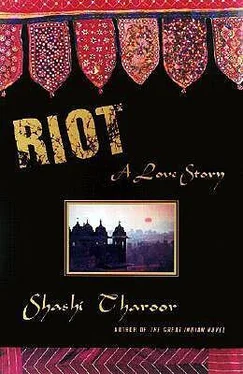Gurinder said he was telling me this because he wanted me to do everything I could to prevent this from happening. He wanted, he said, to save my husband from himself. He was doing this as a friend, because my husband would not listen to his advice that what he was doing was wrong.
What can I do, I wailed. That is up to you, Gurinder said. Plead with him. Love him. Make him feel he must stay. You must fight to keep your husband, Geetha, or you will lose him.
Swamiji, my heart broke. When Gurinder left I rushed to my husband’s study, where he keeps all his papers. He is often there, even at night, writing, writing, so much. He gets up at night to go and write there and I pretend to be asleep because I know he doesn’t want me to know what he’s doing. Sometimes, in the old days, when he went to work I used to sneak in and read what he had written. But it was all very difficult Yinglish poetry that I could not understand. So for a long time I had not bothered to read his writings. Now I knew I had to.
This time it was heartbreaking, Swamiji. What Gurinder had told me is true! He is having an affair with this woman. He has written so many chhi-chhi things about the things they do together. And he has written that he does not love me and he is thinking of leaving me and our daughter. What can I do, Swamiji? I cannot talk to him about this. It would kill me if I had to tell him what I knew! I can only turn to God, Swamiji, and to you. Please conduct a special puja for me to help me keep my husband!
Yes, of course, Swamiji. Beyond a puja? Anything you say. No, no, I don’t have to ask my husband for money. My father will send you the money. I don’t care about the expense. I don’t care how you do it. Use tantra, do the tandava, use anyone and anything you want, Swamiji, but please don’t let this foreign devil-woman run away with my husband….
Ram Charan Gupta to Randy Diggs
(translated from Hindi)
October 12, 1989
I shall be frank with you, Mr. Diggs. I don’t know whether I am wasting my time talking to you. You foreign journalists and photographers who cover India are only interested in the kind of India you want to see. The horrible, dark India of killing and riots, like this riot that you are so interested in, of course: it is all of a piece with the stories of poverty and disease, of the widows of Benares, the caste system and the untouchables, poor people selling their blood or their kidneys, the slums of Calcutta or Bombay, brides being burned for not having brought enough dowry — how many such stories have you written for your American readers, Mr. Diggs? Of course it is even better if the bad things about India are being set right by kind white Christians — Mother Teresa is a real favorite of yours, I’m sure, especially after she won the Nobel Prize, and isn’t a white man making a lot of money these days by selling the pornography of poverty in something he calls “The City of Joy”? I do not deny that these things exist in India, Mr. Diggs, but they are only a part of our reality, and not such a large part of it either. But it is all that you and your cohorts in the foreign press are interested in, and you tell the world that is what India is all about.
You protest, Mr. Diggs? Just because I am speaking to you in Hindi, do not think I cannot read your English-American papers. In fact I will add to my indictment. I have only listed your bad-news stories, and I know you write less negative pieces too. But what are those, Mr. Diggs? Exotic local color. The maharajas and their palaces, their polo games, their fabulous wealth, their lavish lifestyles. You westerners are fascinated by them long after they have lost whatever importance they had in my country. Of course you write about Rajasthan, its colorful festivals, the Pushkar Mela, the camel fairs, the religious pilgrimages, the beaches of Goa, the erotic sculptures of Khajuraho. I am glad this brings a few tourists in to spend their American dollars in my country, but do not think, Mr. Diggs, that you or they are seeing “India” either.
So what does that leave us with when it comes to hard news, Mr. Diggs? Simplicities. Hindu-Muslim violence; “Hindu fundamentalism”; the secular Congress Party; the westernized pilot Rajiv Gandhi; the fanatic forces of Hindu revivalism. How many dozens of foreign correspondents are there in Delhi, Mr. Diggs? And how many of those have departed from this stale menu? How many have written stories that pay honor to India’s great culture and civilization, its history, the complexities and philosophical grandeur of Hinduism? I know of very few, Mr. Diggs. I have no reason to believe you are an exception.
I know you are only interviewing me about this riot because an American girl was killed in it. Tragically killed, I grant you that. But dozens of Hindu youths were also killed, stabbed, wounded, and they do not matter to you. You and your tribe will write of attacks on minorities in India, especially Christians, but you will not mention that minorities — Jews, Parsis, Christians, and even Muslims — have found refuge in this country for two thousand years and have been allowed to practice their own faith without hindrance by Hindu rulers. When will you and your friends in the foreign press give your readers an article on the richness and glory of this ancient country, Mr. Diggs, its varied and profound civilization?
Don’t bother to answer me: I know what the truth is. Even before you arrive in Delhi, you foreign presswallahs already have your biases, stereotypes, predilections about India, and they never change with experience. Some of your clichés are romantic ones: John Masters, Gunga Din, the Bengal Lancers, Kipling’s innocent Western jungle boy surrounded by the dark animals of the Hindu kingdom — you know them all. But their stories are not my stories, Mr. Diggs. You are writing Western stories for a Western audience and telling them you are writing about India.
And some of your preconceptions are the obvious ones: poverty, the caste system, the untouchables, religious strife. Your norm is a world without any of these, a world that is prosperous, clean, and tranquil. But do you not have Harlem, Mr. Diggs? Or Appalachia? Don’t think I do not know about your American poverty. Or your discrimination against your Negroes, your so-called blacks. Isn’t that a hundred times worse than our caste system? After all, very often you cannot tell a man’s caste by looking at him, but you can always tell black from white at first glance, can’t you? And don’t you have your own Christian Coalition? How is that different from our Sangh Parivar? Or is religious belief only acceptable in politics if it is Christian, not Hindu?
How many Western lies and distortions about India are we supposed to swallow, Mr. Diggs? The British partition our country, and you put the blame on us. A Christian is killed in a property dispute, and you write that he has been killed because he is a Christian. A politician speaks of rebuilding the most sacred temple of his faith, and you call him an intolerant fanatic.
But then, you don’t make any effort to understand Hindus, do you? It is all received wisdom. You portray us as the weak and helpless victims of millennia of invasions, starting with the Aryans three thousand five hundred years ago, the founding myth of British imperialism which sought to portray a weak and dark subcontinent at the mercy of Caucasian power and strength. But when Hindu historians and archaeologists say it never happened, that the Aryans were Indian, living here along the river Saraswati which has since dried up, they are pooh-poohed as chauvinists or fantasists. You are only too ready to trumpet the great achievements of the Mughals, their art and architecture, but in fact they mostly stole from Hindu talent; did you know that the Taj Mahal was really a Hindu palace? You attack the Hindutva movement as fundamentalist, but you say nothing about the thirteen centuries of Islamic fundamentalism and oppression they are reacting to. India is asserting itself, Mr. Diggs, and your readers are told nothing of the resurgent pride of Indians in their own land, their own culture, their own history. Instead all you can see is the threat to “secularism,” as if that were some precious Indian heritage. What is this dogma imported from the West that I am supposed to fall on my knees before? Can the word “secularism” be found in the Vedas?
Читать дальше












